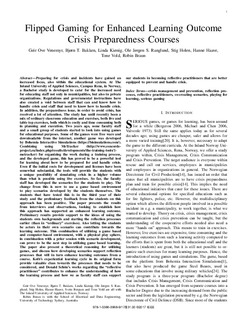| dc.description.abstract | Preparing for crisis and incidents have gained an increased focus, also within the educational system. At The Inland University of Applied Sciences, Campus Rena, in Norway, a Bachelor study is developed to cater for the increased need for educating staff not only in municipalities, but also in private organizations. Regulations and governmental instructions have also created a void between staff that can and know how to handle crisis and staff that need to know how to handle crisis. In addition, the preparedness issue, in order to avoid crisis, has received a lot of attention. The study has until recently been a mix of ordinary classroom education and exercises, both live and table top exercises, both which is costly and time consuming both in planning and execution. Two years ago, some faculty staff and a small group of students started to look into using games for educational purposes. Some of the games were free ware and downloadable from the internet, another game was developed by Bohemia Interactive Simulations (https://bisimulations.com/). Combining using MeTracker (http://www.concordeproject.eu/index.php/results/developments/the-training-tools/1-metracker) for organizing the work during a training process, and the developed game, this has proved to be a powerful tool for learning about how to be prepared for and handle crisis. Even if the initial costs for development and licenses have been somewhat substantial, the tools will provide the students with a unique possibility of simulating crisis in a higher volume than what is possible using live exercises. So far, the faculty staff has developed the scenarios for the students to play. The change from this is now to use a game based environment to play scenarios developed by the students themselves. The students that have tested this is in the third year of their study and the preliminary feedback from the students on this approach has been positive. The paper presents the results from interviews and observations, looking to establish how this approach has supported an enhanced learning outcome. Preliminary results provide support to the ideas of using the students own backgrounds and starting the reflection processes earlier (than in “ordinary” exercises). Also letting the students be actors in their own scenario can contribute towards the learning outcome. This combination of utilizing a game based and computer-based environment, with a physical play sphere, in combination with a prior session with scenario development, can prove to be the next step in utilizing game based learning. The paper also present a theoretical reasoning for utilizing games, and discuss how developing scenarios support reflection processes that will in turn enhance learning outcomes from a course. Kolb’s experiential learning cycle in its original form provide valuable clues towards the processes that needs to be considered, and Donald Schön’s works regarding the “reflective practitioner” contributes to enhance the understanding of how the learning process and how we as faculty staff can support our students in becoming reflective practitioners that are better equipped to prevent and handle crisis. | nb_NO |

